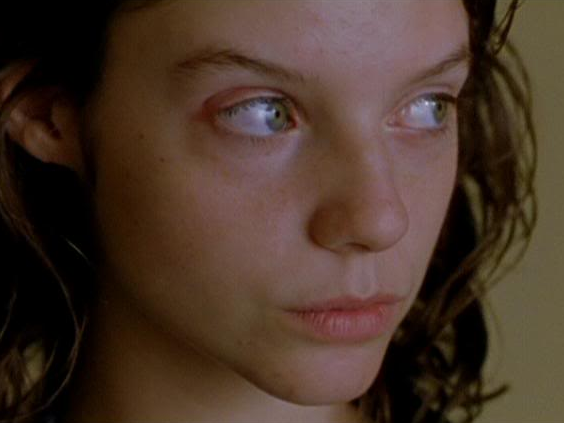
Os Mutantes examines the lives of Pedro, Ricardo and Andreia, three kids in their early teens who have rejected life in juvenile homes or with foster families to take their chances on their own.
“The portrayal of teenage life in Os Mutantes is extremely violent, physical and sensual. As usual in Villaverde’s cinema, her refusal to explain every detail of interior motivation figures as an ethical decision of the filmmaking process. However, the film shows a deep understanding of two fundamental drives that these teenagers share. First, the urge for freedom, which prompts them to constantly escape; and second, their deep anxiety over not being loved, the feeling that they have been abandoned, and the fear of being forgotten – which pushes them to inscribe their names in walls so as to affirm their identities, if only in a precarious way. This is a typical gesture for characters in the genre of juvenile delinquent films internationally, but Villaverde’s treatment of it – with a choral polyphony of voices on the soundtrack laid over the impressionistic montage of wall inscriptions – gives it a special poetry.”
Adrian Martin and Cristina Álvarez López1
“I started by wanting to make a documentary about childhood in Portugal, in all sorts of social environments. I had heard a child from a small town close to Lisbon asking if in the capital city we had spaceships, and I was amazed that for these clever kids, who were so close to us, Lisbon was this incredible place, full of extraterrestrials. I was interested in their way of thinking. So I spent almost one year doing research, without shooting, talking to children and to the people who worked with them. Unfortunately, I wasn’t able to raise money for the documentary. Without thinking, I then started to write fiction, based on the knowledge that I already had. I’d had quite a bit of freedom previously, so I’d seen that, for example, at that time, you would find in the same institution kids who were victims of abuse and a kid who had killed someone. Nowadays that’s changed, but that’s how it was back then. I had met a lot of kids, so I already had the actors in mind for the main parts, because the story had to do with them. But when the government read my script, they didn’t allow me to go back to shoot with those kids. I had to do a real casting with kids from other institutions that didn’t depend on the government – church sponsored, and so on.”
Teresa Villaverde2
« Par l’opacité première de ses personnages et le milieu dans lequel s’inscrit leur parcours, Os Mutantes rappelle un autre film portugais récent, Ossos de Pedro Costa. Mais, malgré les nombreuses similitudes qui existent entre ces deux beaux films, leurs mises en scène témoignent d’approches radicalement différentes. Ossos était, peut-être délibérément, d’un accès difficile, demandant un travail d’approche au spectateur, dont la présence n’était à la limite pas indispensable : qu’il soit là ou non, les plans s’enchaînaient, très rigoureusement composés, un éternel recommencement, mais à chaque fois plus pesant ; le spectateur pouvait aller vers le film, s’absenter, revenir, sans que cela ne porte à conséquence. A l’inverse, Os Mutantes est un film qui, en raison de sa retenue et de la durée de ses plans, nous regarde. Littéralement, le temps de deux regards caméra, mais surtout dans ces moments où la violence à l’œuvre dans le champ contraste avec un filmage et un cadrage très posés, très maîtrisés. »
Erwan Higuinen3
- 1Adrian Martin and Cristina Álvarez López, “Broken Links: The Cinema of Teresa Villaverde,” Film Critic: Adrian Martin, 2014.
- 2Teresa Villaverde in Ela Bittencourt, “‘One day, the swan sang this with its wings’. An Interview with Teresa Villaverde,” Senses of Cinema, 2012.
- 3Erwan Higuinen, “Os Mutantes,” Cahiers de Cinéma, 1999.

